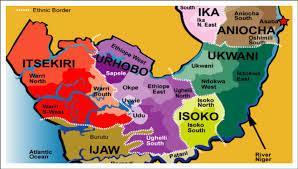A storm of reactions has trailed the Delta State Government’s recent response to growing accusations that the Isoko Nation has been marginalized in the latest N230 billion infrastructure rollout. What began as murmurs of discontent within Isoko communities quickly escalated into heated debates online and offline, with many residents expressing outrage over what they perceive as systemic neglect.
Leading the charge were voices like Eloho Edoro, who argued that none of the projects cited by the state could match the scale or cost of the flyovers being constructed in the Urhobo heartland.
Zark Edugbo pointed to the complete lack of internal road development in Emede and highlighted a near-tragic incident caused by a neglected drainage system that almost claimed the life of Mr. Ekpemede Amidu. He called for an urgent fact-check of government claims versus ground realities.
Iviri Enifome voiced deeper frustrations, lamenting that despite being one of the highest oil-producing communities and a key contributor to Delta’s voting power, the Isoko Nation continues to receive less in terms of capital-intensive projects. Echoing this, Omenuwoma Josiah posed a pointed question: if other ethnic nationalities are being heavily invested in, why should the Isoko people be treated as second-class citizens in their own state?
In a particularly emotional comment, Elvis Brave condemned what he termed “pure wickedness” by the state leadership and accused some Isoko appointees of betraying their people for political appointments. He warned that ancestral justice awaits those benefitting from the region’s wealth while enabling its continued marginalization.
However, not all voices were confrontational. Legal practitioner Barr. Afahokor Duncan provided evidence that Umeh Bridge and its surrounding roads, previously ravaged by floods, were indeed rehabilitated under the current MORE Agenda. He stressed the need for fact-based, results-oriented advocacy.
Meanwhile, Israel Adoke called for constructive dialogue, noting that the controversial flyovers, particularly the Otowodo-Ughelli structure, serve as critical links not just for Urhobo communities but for Isoko residents traveling across Delta and to neighboring states.
Amid the tension, the Delta State Government, through Commissioner for Works (Rural Roads), Mr. Charles Aniagwu, issued a formal response denying any deliberate exclusion of Isoko from its development plans. Aniagwu insisted that Governor Sheriff Oborevwori’s administration remains committed to inclusive growth, with over 53 strategic projects delivered, ongoing, or approved within Isoko North and South LGAs.
Related Articles:
- Delta Govt explains why it pays 40% mobilization, 100% on certification
- Delta Govt establishes free genotype testing centres for newborns to combat sickle cell
- Delta Govt cracks down on illegal waste disposal after devastating Agbor floods
He cited the construction and rehabilitation of major roads, including the Emevor-Ivrogbo-Orogun corridor, the Ellu-Aradhe Road, and internal routes in Ofagbe and Otor-Igho. Additional works include road linkages in Iyede, Iwride, and Aradhe, along with a comprehensive overhaul of the Ekiugbo-Iyede/Emevor Old Road with four new spurs.
In Isoko South, communities such as Oleh, Irri, Aviara, Emede, Igbide, and Uzere have reportedly benefited from several infrastructure upgrades, including the Okpolo-Enhwe-Uwheru Road, Ajuwawa Layout Roads, and the Uruaka-Express Link Road in Emede.
In education, Aniagwu pointed to the transformation of Southern Delta University (SDU), Ozoro, where new academic structures have been completed, 75 staff recruited, and a new College of Medical Sciences launched. He also highlighted the establishment of the College of Health Technology in Ovrode and the ongoing equipping of the General Hospital in Ozoro.
Primary healthcare centres in Emevor, Irri, Ofagbe, Iyede, and several others have reportedly undergone significant renovation and equipment upgrades, moves that Aniagwu says directly benefit rural Isoko populations.
He emphasized that development under the MORE Agenda is evidence-based, not politically motivated, and called on community leaders to focus on fact-driven dialogue.
“The records speak clearly. No region has been excluded. From roads and schools to hospitals, Isoko has seen significant progress,” Aniagwu said. “While it’s natural for citizens to demand more, we must also recognize what has been achieved. Constructive engagement, not division, is the way forward.”
As the fallout continues, what remains undeniable is the emotional intensity surrounding infrastructure equity in Delta State. While the government insists on balanced development, Isoko voices, empowered by data and history, are demanding more than reassurances. They want visibility, fairness, and a future that reflects their economic and political contributions to the state.






